Best DDoS protection of 2025
Keep your web services from being overwhelmed with a little help from these industry legends
The best DDoS protection services make it simple and easy to stop your business from falling victim to a DDoS attack.

1. Best overall
2. Best general
3. Best for real-time protection
4. Best for AWS
5. Best for Azure
6. Best for Asia
7. FAQs
8. How we test
Distributed Denial of Service (DDoS) attacks have the potential to cost businesses a lot of lost revenue that even the best web hosting providers can struggle to mitigate. They work by using a bot network to flood a particular target server with frivolous requests, in the hope that the server will become so overwhelmed it slows to a stop.
This is a problem because if the server is unable to respond to normal user requests, then any website or software being hosted by it will no longer be accessible. Even worse is that hackers can then jump in and try to take control of any server systems as they try to come back online, as with most server functions reduced or restricted the server can become especially vulnerable to attack.
If that wasn't bad enough, DDoS attacks can last for hours or even days, bringing your business to a halt.
The only way to try and mitigate such an attack is to begin to filter the incoming web traffic, IP by IP, which is a slow and laborious process, and not always effective if a large bot network is directed against you.
Therefore the ability to prevent a DDoS attack from happening in the first place can give you a very real peace of mind.
In this guide you'll discover major infrastructure providers who can provide the best DDoS protection, as they have the necessary digital muscle to protect against attacks designed to flood your network capacity.
Gcore DDOS protection offers hosting, cloud, storage, CDN, DNS, streaming platform, and security. Covering up to three layers, with a focus on network (L3) and transport (L4), its firewall provides real-time bot protection.
Preferred partner (What does this mean?)
The best DDoS protection of 2025 in full:
Why you can trust TechRadar
Best overall
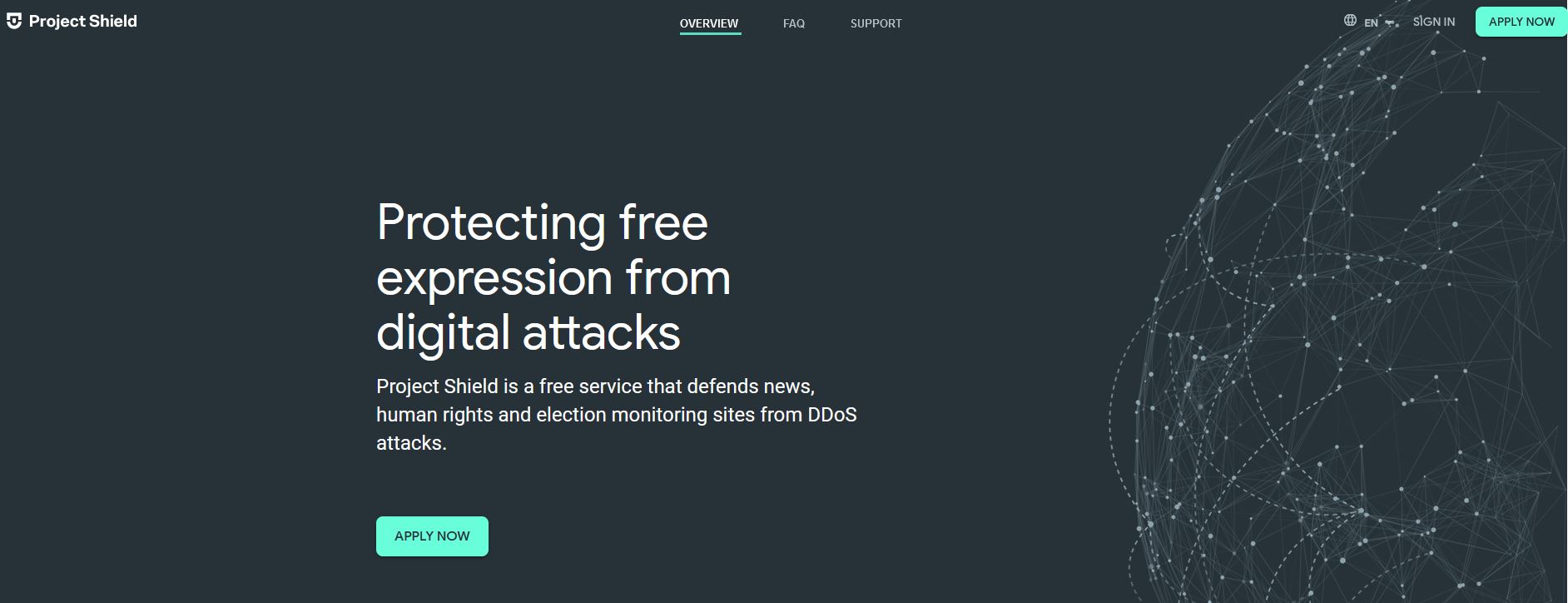
1. Project Shield
Reasons to buy
Reasons to avoid
Project Shield is the creation of Jigsaw, an offshoot of Google's parent company Alphabet. Development began several years ago under George Conard in the wake of attacks on election monitoring and human rights related websites in the Ukraine.
Project Shield is able to filter potential malicious traffic by acting as a reverse proxy which sits between a website and the internet at large, filtering connection requests. If a connection seems to be from a legitimate visitor Project Shield permits the connection request. If a connection request is determined to be bad e.g. multiple connection attempts from the same IP address, then it is blocked. This system makes Project Shield extremely easy to implement simply by changing your server's DNS settings.
Any power users reading may wonder how filtering traffic via a proxy will work with SSL. Fortunately, Jigsaw has thought of this and has put together a comprehensive tutorial to make sure secure connections to your site work seamlessly. Several other tutorials are also available in the support section.
Currently Project Shield is only available for media, election monitoring and human rights related websites. The primary focus is also on small under resourced websites which cannot afford expensive hosting solutions to protect themselves for DDoS. If your organization doesn't match these requirements you may have to consider an alternative solution such as Cloudflare.
Best general
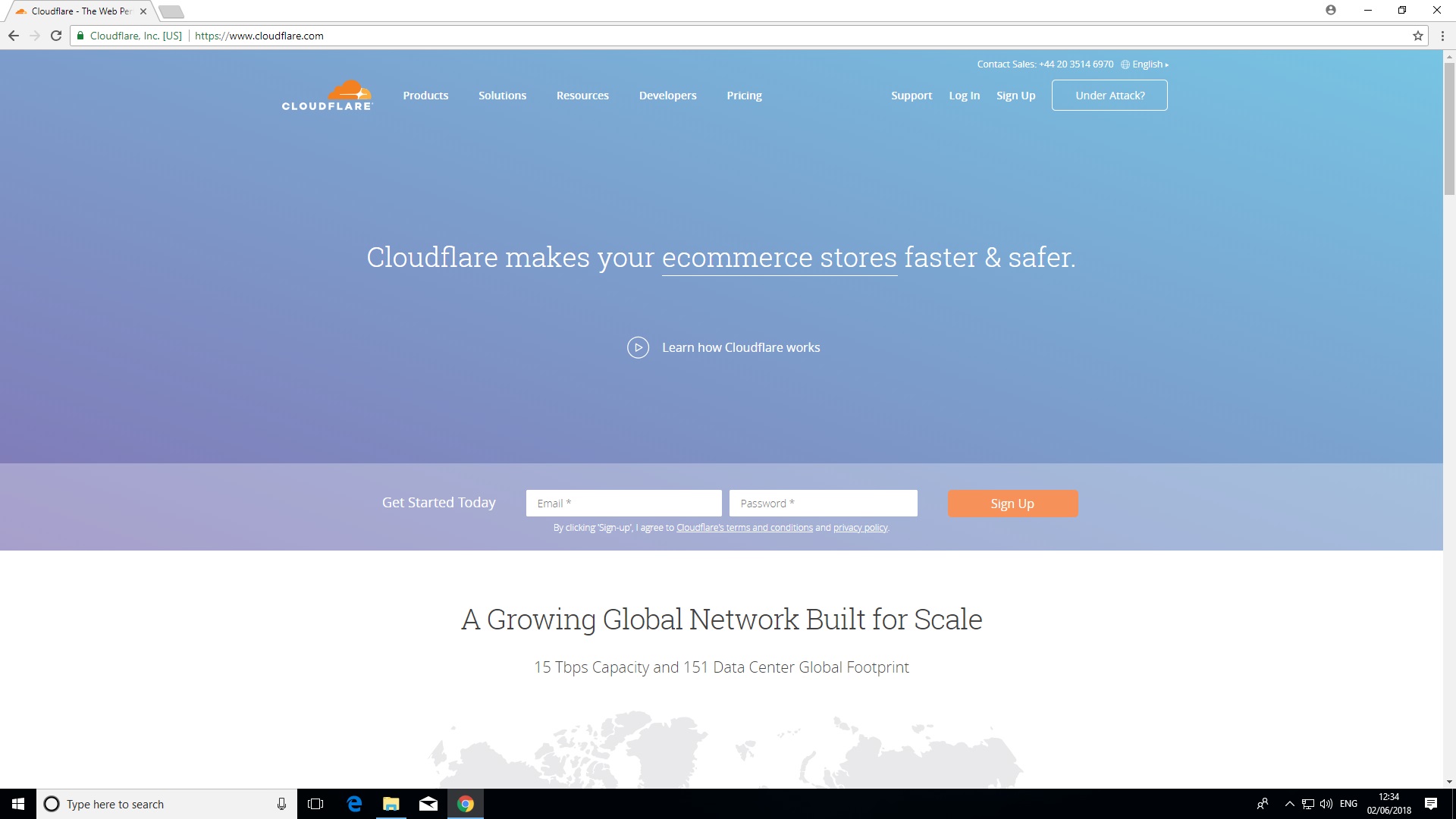
Reasons to buy
Reasons to avoid
Anyone who has used the Internet in the last few years will be familiar with Cloudflare as many major websites make use of its protection. Although Cloudflare is based in the US it maintains over 180 data centers around the world: an infrastructure to rival Google's. This maximizes your site's chances of staying online.
Every Cloudflare user can choose to activate the 'I'm under attack' mode which can protect against even the most sophisticated of DDoS attacks by presenting a JavaScript challenge. As a matter of routine Cloudflare also acts as a reverse proxy sitting between visitors and your site host to filter traffic in much the same way as Jigsaw's Project Shield.
Visitors making connection requests have to run a gauntlet of sophisticated filters including site reputation, whether their IP has been Blacklisted and if the HTTP header seems suspicious. HTTP requests are finger printed to protect against known Botnets. As an industry giant, Cloudflare can easily leverage its position by sharing intel across the 7+ million websites it protects.
Cloudflare offers a free basic package which includes unmetered DDoS mitigation. For those who are willing to pay for a Cloudflare business subscription more advanced protection is available.
Read our full Cloudflare review.
Best for real-time protection
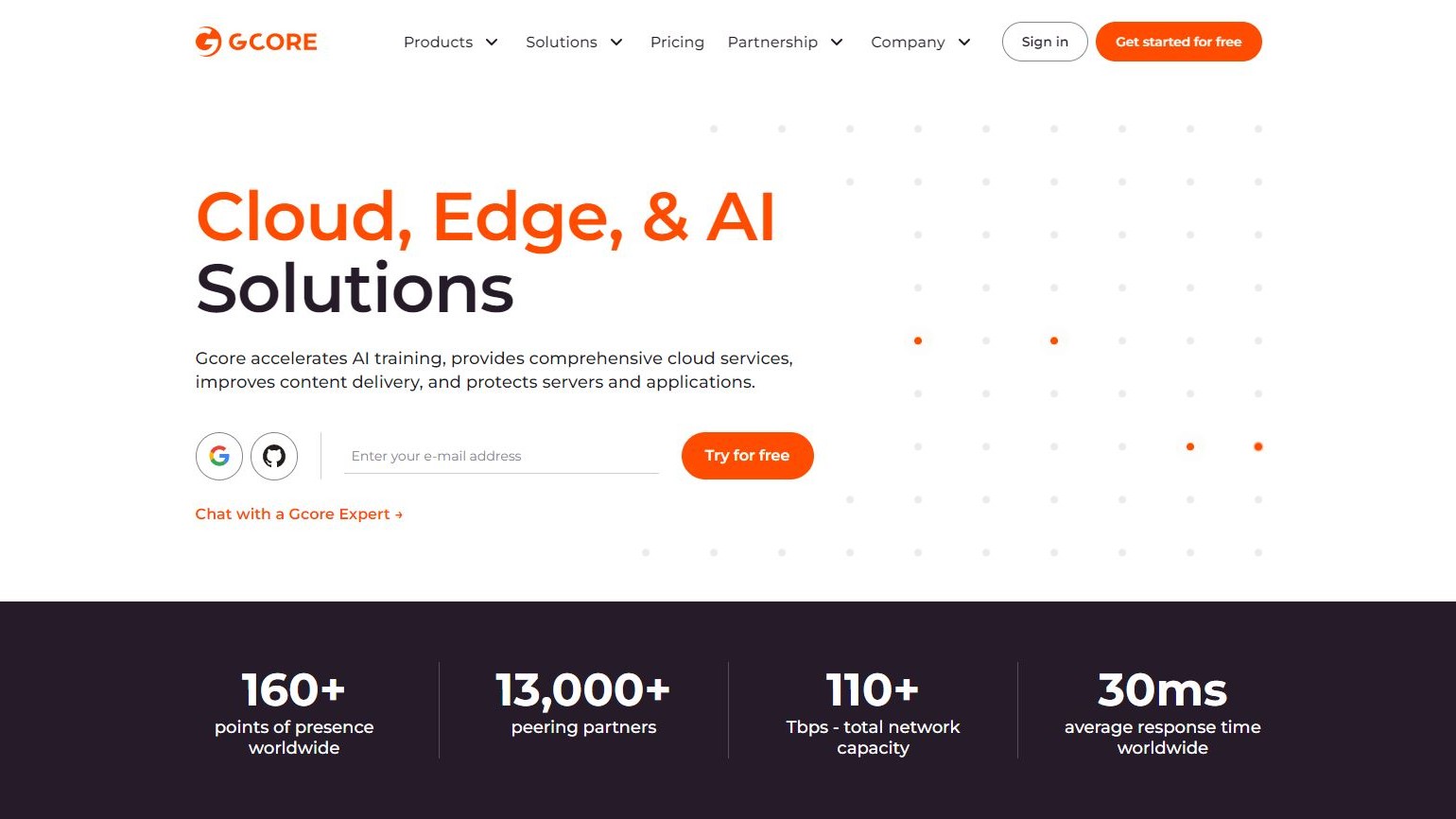
Reasons to buy
Reasons to avoid
Gcore stands out with its premium web services, boasting state-of-the-art features and enhanced security. It caters to all contemporary web requirements, offering a range of efficient solutions, including hosting, cloud, storage, CDN, DNS, streaming platform, and security.
These services aim to protect users up to three layers, with a special focus on the network (L3) and transport (L4) layers. Thanks to its advanced firewall, it offers real-time bot protection and is one of the best in this field. What’s more, GCore is open to working with clients to develop custom features tailored to their businesses' specific needs. Keep in mind that a custom solution will require substantial technical knowledge from your side.
Gcore approaches pricing through a tiered system, especially their DNS services. Businesses needing the most comprehensive feature set can opt for the ‘Enterprise’ tier, for which you will have to contact the sales team. Server protection pricing is structured slightly differently. The 'Start' tier is priced at €2.60 per month, providing L3 and L4 protection for 1 Mbps of traffic. The 'Pro' tier, at €3.90 per month, expands the protection to include the L7 layer for the same amount of traffic. This pricing and service structure positions GCore as a versatile option for businesses of various sizes, ensuring reliable protection in the ever-evolving digital landscape. Yet, we would have liked the pricing structure to be structured in a more user-friendly manner and more transparent overall.
Best for AWS
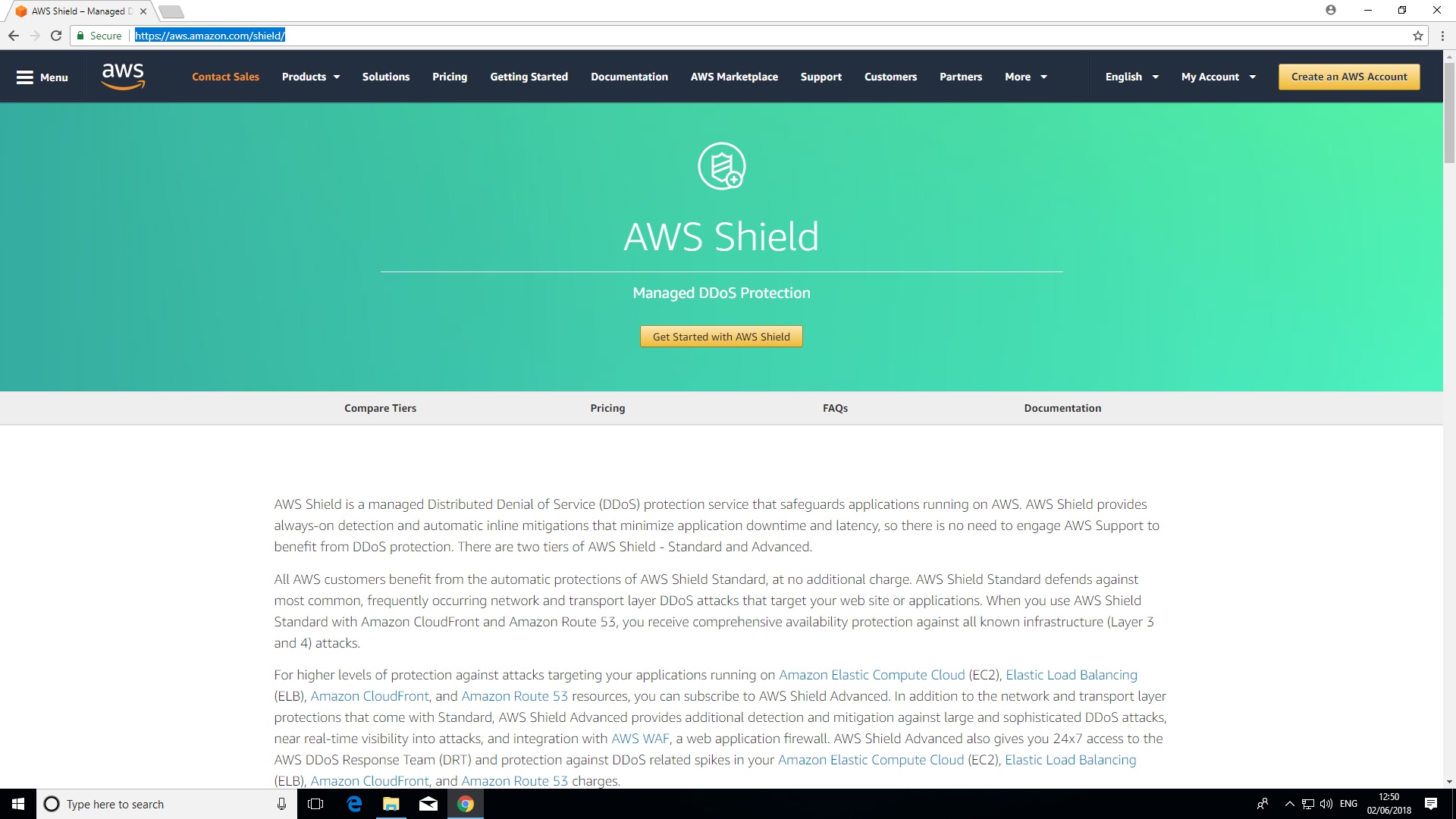
4. AWS Shield
Reasons to buy
Reasons to avoid
AWS Shield protection is provided by the good people of Amazon web services. The 'Standard' tier is available to all customers at no extra charge. It protects against more typical network (layer 3) and transport (layer 4) attacks when used Amazon's Cloud Front and Route 53 services.
This should put off all but the most determined hackers. However, your bandwidth e.g. 15Gbp/s will still be limited by the size of your Amazon instance, making it feasible for hackers to carry out a DDoS attack if they have sufficient resources. Worse still, you remain responsible for paying for the extra traffic to your instance.
To mitigate this Amazon also offers AWS Shield Advanced. A Subscription includes DDoS cost protection, which can save you from a huge spike in your monthly usage bill if you are the victim of an attack. AWS Shield Advanced can also deploy your ACL's (Access Control Lists) to the border of the AWS network, giving you protection against even the largest of attacks. Also, web applications are now automatically protected against DDoS attacks by AWS Shield Advanced without the need for manual intervention.
Advanced Subscribers also benefit from a round the clock DRT (DDoS Response Team) as well as detailed metrics on any attacks on your instances. The peace of mind afforded by AWS Shield Advanced is expensive however. This is in addition to data transfer usage costs which you can cover on a 'pay as you go' basis.
Best for Azure
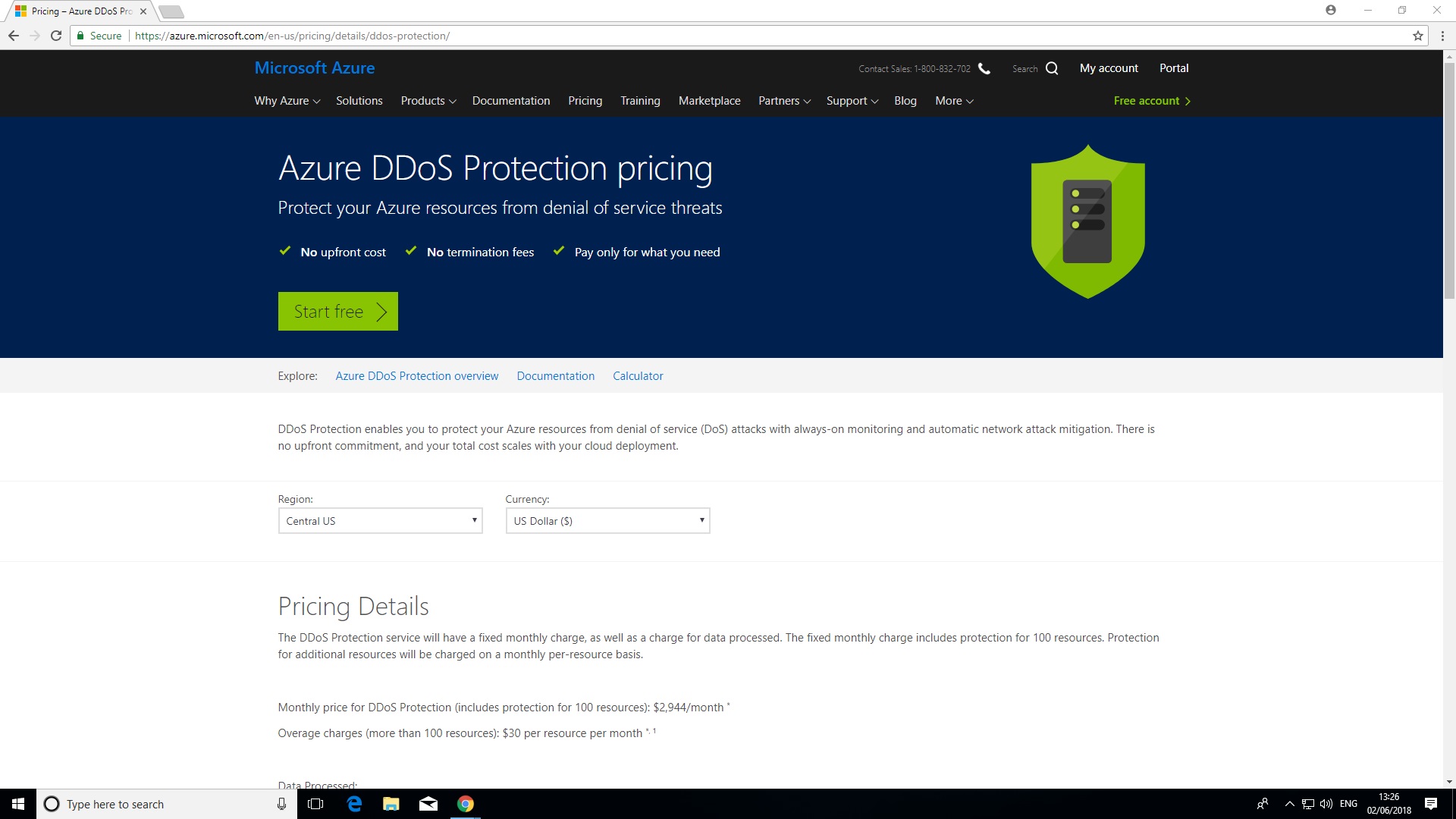
Reasons to buy
Reasons to avoid
Like Amazon, Microsoft offers the option to rent service space via their service Azure. All members benefit from basic DDoS protection. Features include always on traffic monitoring and real time mitigation of network (layer 3) attacks for any public IP addresses you use. This is the very same type of protection afforded to Microsoft's own online services and the entire resources of Azure's network can be used to absorb DDoS attacks.
For organizations in need of more sophisticated protection Azure also offers a 'Standard' tier. This has been widely praised for being very easy to enable, requiring just a few clicks of your mouse. Crucially Azure does not require you to make any changes to your apps although the standard tier does offer protection against application (layer 7) DDoS attacks via the app gateway web app firewall. Azure monitor can show you real time metrics if an attack does take place. These are retained for 30 days and can be exported for further study if you wish.
Azure constantly checks web traffic to your resources. If these exceed a pre-defined threshold, DDoS mitigation is automatically launched. This includes inspecting packets to make sure they aren't malformed or spoofed as well as using rate limiting.
Best for Asia
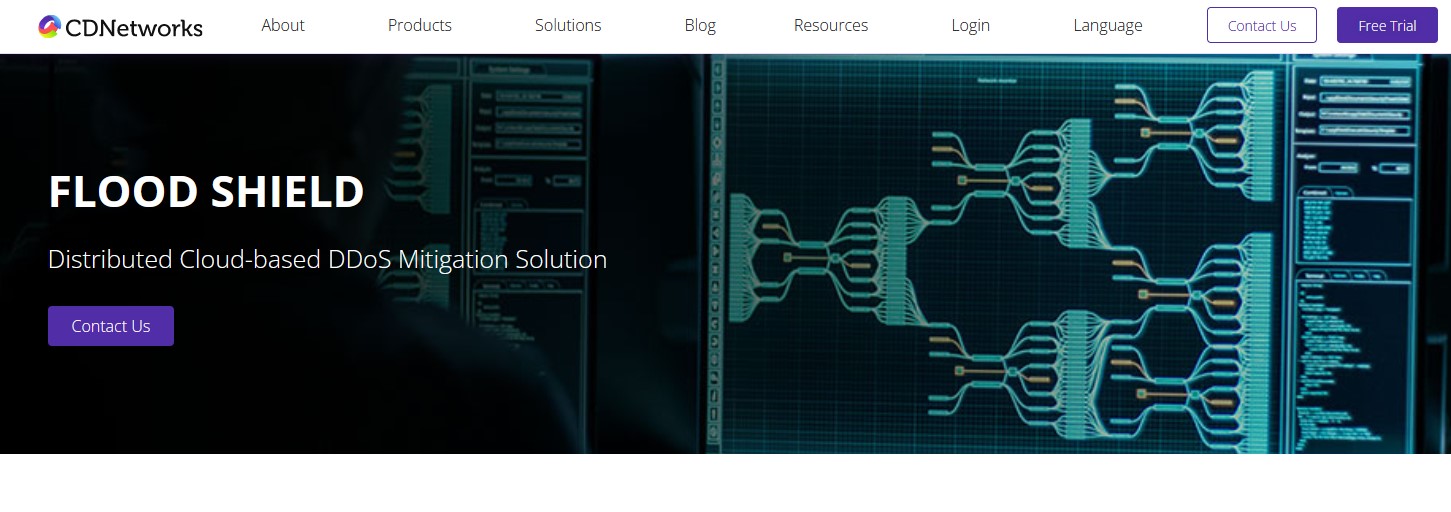
Reasons to buy
Reasons to avoid
CDNetworks (formerly CDN360) is a powerful CDN service that offers various other cloud solutions, like media streaming, object storage, web application firewalls, and so on. However, it is its Flood Shield product that makes it a great DDoS protection provider.
Flood Shield is a cloud-based DDoS protection service that aims to deliver fast, simple, and most importantly, effective DDoS protection. It is designed to protect websites, web apps, and network infrastructure from attacks such as SYN Flood, ACK Flood, ICMP Flood, UDP Flood, HTTP Flood, SlowLoris attack, Layer 3/4 and Layer 7, and so on.
The service has a good deal of features like the option to customize access policies and rate limiting in advance to avoid attacks and abuse of resources, or alerting options that notify you any time there are some irregularities with a website.
Flood Shield has a 15+ Tbps of mitigation capacity and over 20 global DDoS scrubbing centers. Also, HTTP/HTTPS and TCP/UDP protocols are supported. In addition, you can have three presets for DDoS attack protection that are easy to switch when responding to different types of attacks.
While CDNetworks has pricing plans for the CDN service, if you solely want the DDoS protection via Flood Shield, you’ll have to contact them first. You do get a 30-day free trial though, if you want to check it out before anything else.
We've also featured the best IP address tools.
DDoS protection FAQs
Which DDoS protection is best for you?
When deciding which DDoS protection to use, first consider what your actual needs are, as budget software may only provide basic options, so if you need to use advanced tools you may find a more expensive platform is much more worthwhile. Additionally, higher-end software can usually cater for every need, so do ensure you have a good idea of which features you think you may require from your DDoS protection.
How we tested the best DDoS protection
To test for the best DDoS protection we first set up an account with the relevant provider, then we tested the service to see how it could be used for different purposes and in different situations. The aim was to push each DDoS protection service to see how useful its basic tools were and also how easy it was to get to grips with any more advanced tools.
Read more on how we test, rate, and review products on TechRadar.
Get in touch
- Want to find out about commercial or marketing opportunities? Click here
- Out of date info, errors, complaints or broken links? Give us a nudge
- Got a suggestion for a product or service provider? Message us directly
- You've reached the end of the page. Jump back up to the top ^
Are you a pro? Subscribe to our newsletter
Sign up to the TechRadar Pro newsletter to get all the top news, opinion, features and guidance your business needs to succeed!
Nate Drake is a tech journalist specializing in cybersecurity and retro tech. He broke out from his cubicle at Apple 6 years ago and now spends his days sipping Earl Grey tea & writing elegant copy.
- James CapellB2B Editor, Web Hosting
